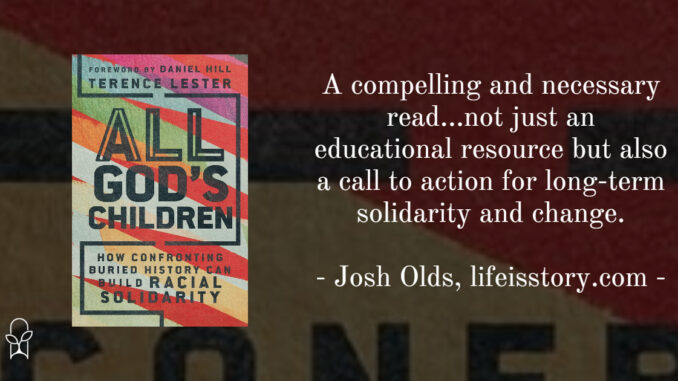
Also by this author: Zion Learns to See: Opening Our Eyes to Homelessness
Published by IVP Books on June 20, 2023
Genres: Non-Fiction, Racial Reconciliation
Buy on Amazon
Goodreads

The more you understand someone's history, the better you can see their humanity. This is true for individuals as well as for society at large. Race relations have suffered because of the erasure of important Black history and cultural context. As we fill in the gaps of our collective knowledge, communities can grow in understanding, empathy, and solidarity.
Terence Lester shares the buried history of the struggles Black people have faced against unjust systems. He tells powerful stories of courage, injustice, pain, and triumph, including ones from his own history. He also unpacks the sociological and cultural dynamics of unconscious bias and inattentional ignorance that keep us apart, and how they can be overcome. This honest account of what it's like to be Black in America paves the way for the church to move beyond showing support from a distance toward loving one another in long-term solidarity, advocacy, and friendship.
Though the furor seems to have died down in the current cultural moment, there was a time just a few years ago when the removal and replacement (or even just contextualization) of statues honoring Confederate soldiers were seen by some as an attack on history. One side argues that these statues memorialize and glorify slavery, causing undue pain to the descendants of the enslaved. The other side argues that they are nonbiased markers of history and that removing those markers is tantamount to erasing history. Who is right?
We must remember our history. That’s the message Terence Lester preaches in All God’s Children: How Confronting Buried History Can Build Racial Solidarity. So that statues should stay up, right? Not exactly. Because within that message is the reminder that we must not only remember history but confront it and understand it and speak of it accurately. Most Confederate monuments weren’t built to accurately depict history, but to offer a recontextualization of it that fails to confront the realities of racial injustice. That is what we must confront and tear down if we are to build racial solidarity.
All God’s Children isn’t a book about Confederate monuments, but I felt when reading this book that they are an appropriate metaphor. They are honored edifices that tell the wrong story and prevent us from achieving solidarity and justice. Lester believes that when we understand the real history, we can begin to make strides toward solidarity. When we truly know another person’s context—historical, cultural, or personal—we are more likely to stand with them and understand what is needed for their flourishing.
The end message of All God’s Children is that we must be the solution. Lester uses the example of Jesus talking to his disciples about the gathered crowd of more than 5,000. The disciples bring to Jesus a problem: “The people are hungry.” Jesus says, “You give them something to eat.” He’s asking us to offer ourselves as five loaves and two fish and allow God to multiply that until all are satisfied. The work of racial solidarity begins with us. We cannot back out of action simply because the task seems too great.
Throughout the book, Lester offers several different ways to gain understanding and take action. The predominant one is simple to know and understand the issues our neighbors and our neighborhood faces. I know that, for myself, my start in advocating for racial solidarity came with having my eyes opened to the experiences of my non-white friends. All God’s Children includes chapters about practicing proximity, sitting at another’s table, and teaches us ways to engage with others and learn about them. Lester also interweaves his own story, allowing readers to look into his life and learn from his experiences.
All God’s Children is a compelling and necessary read. It not only sheds light on the buried history and ongoing struggles of Black Americans but also provides a pathway for individuals and communities to engage actively in building a more empathetic and united society. Lester’s personal accounts add a powerful and authentic voice to the narrative, making it not just an educational resource but also a call to action for long-term change and solidarity.
